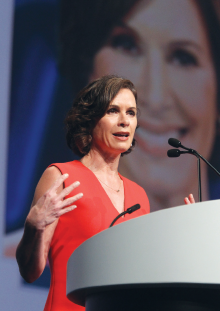Elizabeth Vargas, who delivered the 2017 William C. Menninger Memorial Award Lecture at APA’s Annual Meeting last month, has traveled the world covering breaking news stories, reporting on in-depth investigations, and conducting interviews with high-profile newsmakers. She’s been credited by The New York Times for reinvigorating the newsmagazine format with her “intellectually brave” reporting.
“But in the past two years, I have become known for something else,” Vargas said. “I made headlines because I was forced to admit publicly that I am an alcoholic.”
The award-winning co-anchor of ABC’s “20/20” with David Muir delivered a candid address, describing the evolution of her alcoholism and its roots in a gripping anxiety she has experienced since childhood. In September 2016, Vargas published the memoir Between Breaths: A Memoir of Panic and Addiction. The book details her struggles with anxiety and alcohol abuse and tells a powerful story of recovery and coping.
“My earliest memories are infused with anxiety,” Vargas said. “I’m an Army brat, and my father was a lifetime Army officer. When I was 6, we were stationed in Japan when my dad went to Vietnam. That’s when my anxiety moved in and took over my life.
“I began to have these panic attacks when I would cling to my mother’s skirts shrieking for her not to leave me. My mother didn’t know how to care for my anxiety, and I don’t judge her for that. We weren’t even paying attention then to soldiers returning from the war with PTSD, and we certainly weren’t paying attention to their children.”
She also learned how to hide her distress. Vargas recalled a neighbor being recruited to look after her when her pregnant mother was in the hospital. When Vargas had a panic attack, the neighbor asked her incredulously, “What in the world is the matter with you?”
“That’s when I learned my panic and anxiety were shameful and were something I must hide,” Vargas said. “I literally white-knuckled my way through childhood and adolescence. Through it all I kept my anxiety a secret. I didn’t have a name for it. All I knew was that I seemed to be suffering in a way no one else was. I was singular in my struggle. That meant something must be wrong with me.”
It was years later, on her first job as a local television anchor, that Vargas said she learned of the “powerful seduction” of a glass of wine.
“It had a profound effect on my anxiety,” she said. “Suddenly the world seemed gentler. Those nightly glasses of wine became a routine for me. Over the decades I needed that wine to relax. By the time I made it to network, I was drinking wine every night. I needed that wine to ease my stress, and I failed to recognize its power.”
Over time the drinking escalated—“the nightly glass of wine morphed into a bottle of wine,” she said—and a familiar story ensued of alcoholic disintegration. “What I regret most about my disease was the life I missed out on, so many precious moments with my children,” she said. “I loved my children more than the universe, but I couldn’t stop drinking for them. When you are in the grip of this disease, you don’t see it.”
In time she bottomed out and sought help. Recovery wasn’t immediate—she would relapse and return to rehab—but today it has been years since she last had a drink.
Her presence at the rehab was leaked to the press, and Vargas’s plight was made public. Though that publicity was unsought, Vargas said that the 2012 memoir was a coming-clean.
“The response to my story has been extraordinary,” she said. “People have stopped me on the street to tell me I saved their life. I don’t know if that is true—it sounds rather grandiose to me. But the relief that I felt in writing this book and coming clean was enormous. I do know that if I convinced one other person to get help who needs it, or to reach out and share their experience with someone, and if my story can help reduce the stigma around addiction in even a small way, I will feel that I have contributed something.” ■

